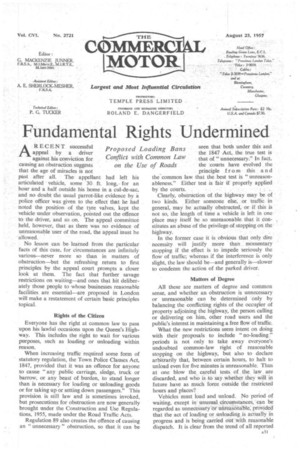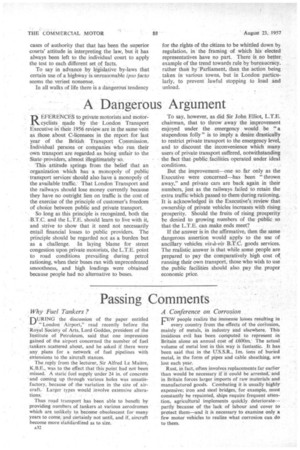Fundamental Rights Undermined
Page 33

Page 34

If you've noticed an error in this article please click here to report it so we can fix it.
Proposed Loading Bans Conflict with Common Law on the Use of Roads
CE N T successful A appeal by a driver against his conviction for causing an obstruction suggests that the age of miracles is not past after all. The appellant had left his articulated vehicle, some 30 ft. long, for an hour and a half outside his home in a cul-de-sac, and no doubt the usual parrot-like evidence by h police officer was given to the effect that he had noted the position of the tyre valves, kept the vehicle under observation, pointed out the offence to the driver, and so on. The appeal committee held, however, that as there was no evidence of unreasonable user of the road, the appeal Must be allowed.
No lesson can be learned from the particular facts of this case, for circumstances are infinitely various—never more so than in matters of obstruction—but the refreshing return to first principles by the appeal court prompts a closer look at them. The fact that further savage restrictions on waiting—and ones that hit deliberately those people to whose businesses reasonable facilities are essential—are proposed in London will make a restatement of certain basic principles topical.
Rights of the Citizen Everyone has the right at common law to pass upon his lawful occasions upon the Queen's Highway. This includes the right to wait for various purposes, such as loading or unloading within reason.
When increasing traffic required some form of statutory regulation, the Town Police Clauses Act, 1847, provided that it was an offence for anyone to cause "any public carriage, sledge, truck or barrow, or any beast of burden, to stand longer than is necessary for loading or unloading goods or for taking up or setting down passengers." This provision is still law and is sometimes invoked, but prosecutions for obstruction are now generally brought under the Construction and Use Regulations, 1955, made under the Road Traffic Acts.
Regulation 89 also creates the offence of causing an " unnecessary " obstruction, so that it can be seen that both under this and the 1847 Act, the true test is that of "unnecessary.' In fact, the courts have evolved the principle •f r o ni this an d the common law that the best test is "unreasonableness." Either test is fair if• properly applied by the courts.
Clearly, obstruction of the highway may be of two kinds_ Either someone else, or traffic in general, may be actually obstructed, or if this is not so, the length of time a vehicle is left in one place may itself be so unreasonable that it constitutes an abuse of the privilege of stopping on the highway.
In the former case it is obvious that only dire necessity will justify more than momentary stopping if the effect is to impede seriously the flow of traffic; whereas if the interference is only slight, the law should he—and generally is—slower to condemn the action of the parked driver.
Matters of Degree All these are matters of degree and common sense, and whether an obstruction is unnecessary or unreasonable can be determined only by balancing the conflicting rights of the occupier of property adjoining the highway, the person calling or delivering on him, other road users and the public's interest in maintaining a free flow of traffic.
What the new restrictions seem intent on doing with their proposals to include "no-loading." periods is not only to take away everyone's undoubted common-law right of reasonable stopping on the highway, but also to declare arbitrarily that, between certain hours, to halt to unload even for five minutes is unreasonable. Thus at one blow the careful tests of the law are discarded, and who is to say whether they will in future have as much force outside the restricted hours and places?
Vehicles must load and unload. No period of waiting, except in unusual circumstances, can be regarded as unnecessary or unreasonable, provided that the act of loading or unloading is actually in progress and is being carried can with reasonable dispatch. It is clear from the trend of all reported cases of authority that that has been the superior courts' attitude in interpreting the law, but it has always been left to the individual court to apply the test to each different set of facts.
To say in advance by legislative by-laws that certain use of a highway is. unreasonable ipso facto seems the veriest nonsense.
In all walks of life there is a dangerous tendency for the rights of the citizen to be whittled down by regulation, in the framing of which his elected representatives have no part. There is no better example of the trend towards rule by bureaucracy, rather than by Parliament, than the action being taken in various towns, but in London particularly, to prevent lawful stopping to load and unload.




































































































